ESP Citroen GRAND C4 PICASSO RHD 2016 2.G Service Manual
[x] Cancel search | Manufacturer: CITROEN, Model Year: 2016, Model line: GRAND C4 PICASSO RHD, Model: Citroen GRAND C4 PICASSO RHD 2016 2.GPages: 523, PDF Size: 13.63 MB
Page 170 of 523
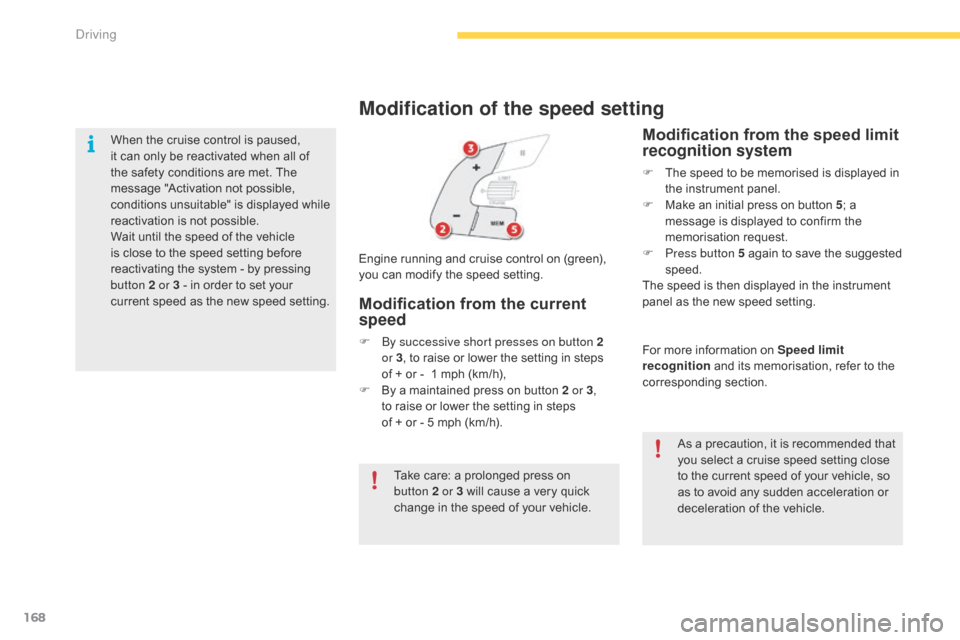
168
When the cruise control is paused, it can only be reactivated when all of
t
he safety conditions are met. The
m
essage "Activation not possible,
c
onditions
u
nsuitable"
i
s
d
isplayed
w
hile
r
eactivation is not possible.
Wait
until the speed of the vehicle
i
s close to the speed setting before
r
eactivating the system - by pressing
b
utton 2 or 3 - in order to set your
c
urrent speed as the new speed setting.
Modification of the speed setting
Modification from the speed limit
recognition system
F The speed to be memorised is displayed in t
he instrument panel.
F
M
ake an initial press on button 5;
a
m
essage is displayed to confirm the
m
emorisation
r
equest.
F
P
ress button 5 again to save the suggested
s
peed.
The
speed is then displayed in the instrument
p
anel as the new speed setting.
As
a precaution, it is recommended that
y
ou select a cruise speed setting close
t
o the current speed of your vehicle, so
a
s to avoid any sudden acceleration or
d
eceleration of the vehicle.
For
more information on Speed limit
recognition
and its memorisation, refer to the
c
orresponding
s
ection.
Engine
running
and
cruise
control
on
(green),
y
ou
can
modify
the
speed
setting.
Modification from the current
speed
F By successive short presses on button 2 or 3,
to raise or lower the setting in steps
of
+ or - 1 mph (km/h),
F
B
y a maintained press on button 2 or 3,
to
raise or lower the setting in steps
of
+ or - 5 mph (km/h).
Take
care: a prolonged press on
b
utton 2 or 3 will cause a very quick
c
hange in the speed of your vehicle.
Driving
Page 176 of 523
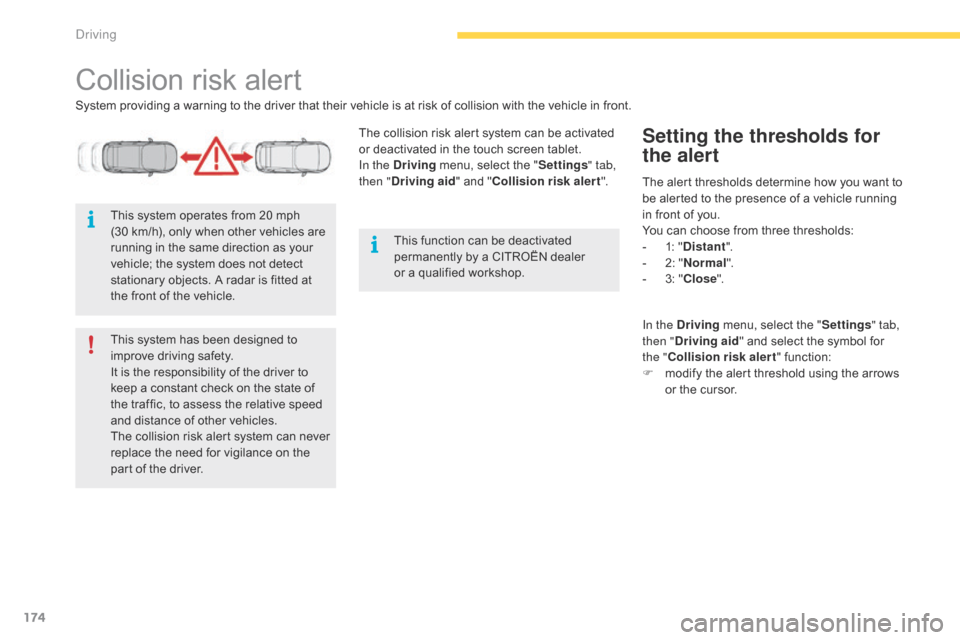
174
Collision risk alert
System providing a warning to the driver that their vehicle is at risk of collision with the vehicle in front.
T he collision risk alert system can be activated
o
r deactivated in the touch screen tablet.
In the Driving
menu, select the "Settings " tab,
then " Driving aid "
and "Collision risk alert ".
This
system has been designed to
i
mprove driving safety.
It
is the responsibility of the driver to
k
eep a constant check on the state of
t
he traffic, to assess the relative speed
a
nd distance of other vehicles.
The
collision risk alert system can never
r
eplace the need for vigilance on the
p
art of the driver.
This
system operates from 20 mph
(
30 km/h), only when other vehicles are
r
unning in the same direction as your
v
ehicle; the system does not detect
s
tationary objects. A radar is fitted at
t
he front of the vehicle. The
alert thresholds determine how you want to
b
e alerted to the presence of a vehicle running
i
n front of you.
You
can choose from three thresholds:
-
1
: "Distant ".
-
2
: "Normal ".
-
3
: "Close ".
Setting the thresholds for
the alert
This function can be deactivated p
ermanently by a CITROËN dealer
or
a qualified workshop.
In the Driving
menu, select the "Settings " tab,
then " Driving aid "
and select the symbol for
t
he "Collision risk alert "
function:
F
m
odify the alert threshold using the arrows
o
r the cursor.
Driving
Page 178 of 523
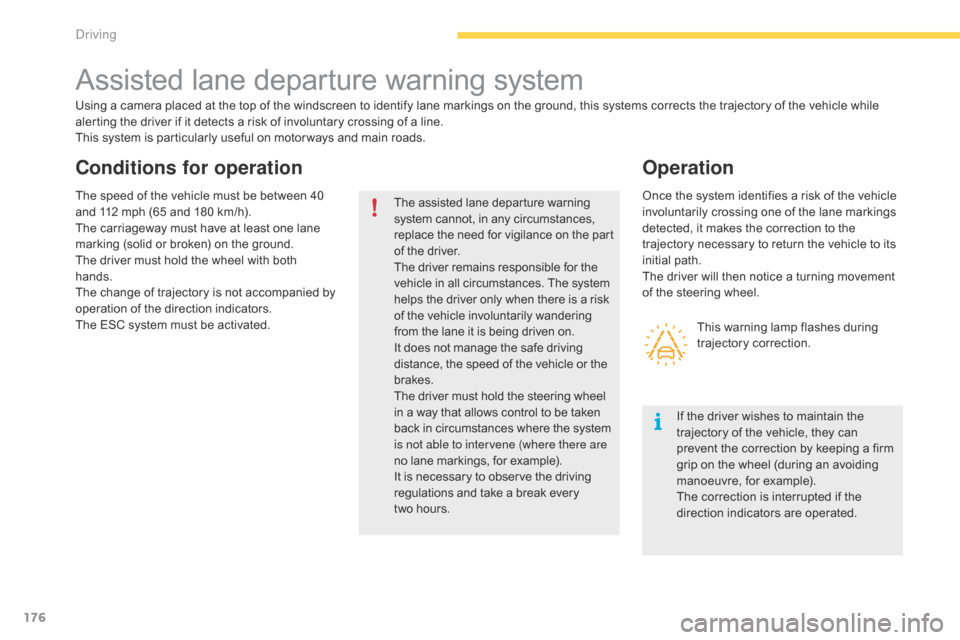
176
Assisted lane departure warning system
Using a camera placed at the top of the windscreen to identify lane markings on the ground, this systems corrects the trajectory of the vehicle while alerting the driver if it detects a risk of involuntary crossing of a line.
This
system is particularly useful on motor ways and main roads.
The
assisted lane departure warning
s
ystem cannot, in any circumstances,
r
eplace
t
he
n
eed
fo
r
v
igilance
o
n
t
he
par
t
o
f the driver.
The
driver remains responsible for the
v
ehicle in all circumstances. The system
h
elps the driver only when there is a risk
o
f the vehicle involuntarily wandering
f
rom the lane it is being driven on.
I
t does not manage the safe driving
d
istance, the speed of the vehicle or the
b
rakes.
The
driver must hold the steering wheel
i
n a way that allows control to be taken
b
ack in circumstances where the system
i
s not able to intervene (where there are
no
lane markings, for example).
It
is necessary to observe the driving
r
egulations and take a break every
t
wo hours.
Operation
Conditions for operation
The speed of the vehicle must be between 40 a
nd 112 mph (65 and 180 km/h).
The
carriageway must have at least one lane
m
arking (solid or broken) on the ground.
The
driver must hold the wheel with both
han
ds.
The
change of trajectory is not accompanied by
o
peration of the direction indicators.
The
ESC system must be activated. Once
the system identifies a risk of the vehicle i
nvoluntarily crossing one of the lane markings
d
etected, it makes the correction to the
t
rajectory necessary to return the vehicle to its
in
itial
pa
th.
The
driver will then notice a turning movement
o
f the steering wheel.
This
warning lamp flashes during
t
rajectory
c
orrection.
If
the driver wishes to maintain the
t
rajectory of the vehicle, they can
p
revent the correction by keeping a firm
g
rip on the wheel (during an avoiding
m
anoeuvre, for example).
The
correction is interrupted if the
d
irection indicators are operated.
Driving
Page 179 of 523
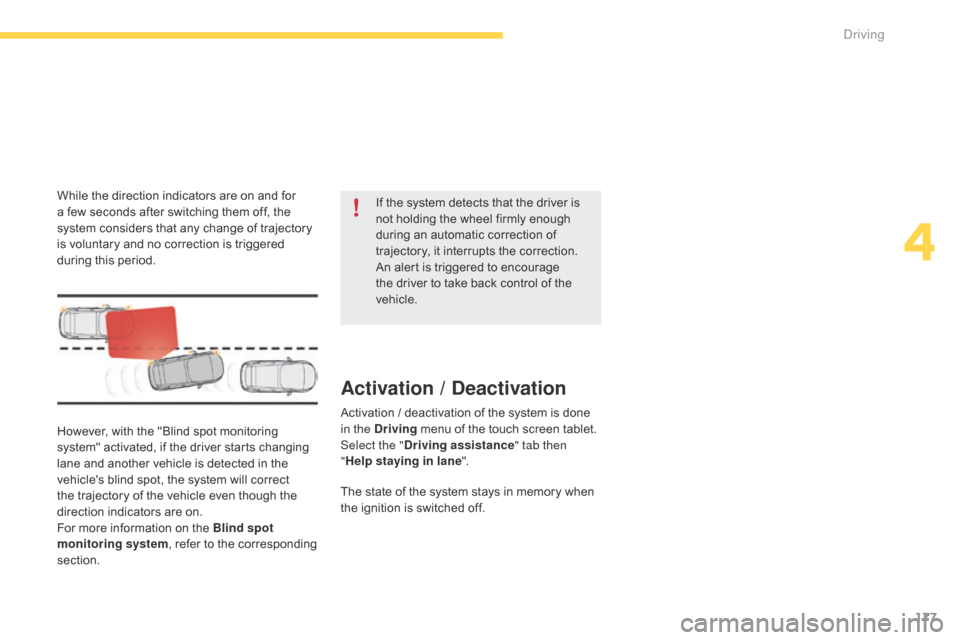
177
However, with the "Blind spot monitoring system" activated, if the driver starts changing
l
ane and another vehicle is detected in the
v
ehicle's blind spot, the system will correct
t
he trajectory of the vehicle even though the
d
irection indicators are on.
For
more information on the Blind spot
monitoring system ,
refer to the corresponding
s
ection. If
the system detects that the driver is
n
ot holding the wheel firmly enough
d
uring an automatic correction of
t
rajectory, it interrupts the correction.
A
n alert is triggered to encourage
t
he driver to take back control of the
v
ehicle.
Activation / Deactivation
Activation / deactivation of the system is done i
n the Driving menu of the touch screen tablet.
Select the " Driving assistance " tab then
" Help staying in lane ".
The
state of the system stays in memory when
t
he ignition is switched off.
While
the
direction
indicators
are
on
and
for
a
few
seconds
after
switching
them
off,
the
s
ystem
considers
that
any
change
of
trajectory
i
s
voluntary
and
no
correction
is
triggered
d
uring
this
period.
4
Driving
Page 182 of 523
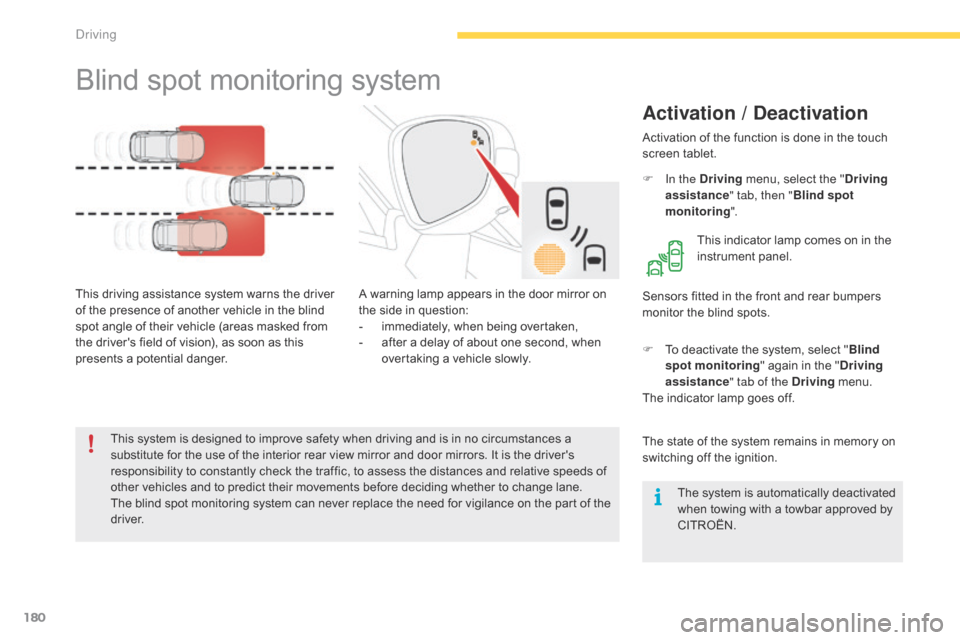
180
Blind spot monitoring system
Activation / Deactivation
A warning lamp appears in the door mirror on the side in question:
-
i
mmediately, when being overtaken,
-
a
fter a delay of about one second, when
ov
ertaking a vehicle slowly.
This
driving
assistance
system
warns
the
driver
o
f
the
presence
of
another
vehicle
in
the
blind
s
pot
angle
of
their
vehicle
(areas
masked
from
t
he
driver's
field
of
vision),
as
soon
as
this
p
resents
a
potential
danger. Sensors
fitted in the front and rear bumpers
m
onitor the blind spots.
This
system
is
designed
to
improve
safety
when driving and is in no circumstances a
s
ubstitute
for
the
use
of
the
interior
rear
view
mirror and door mirrors. It is the driver's
r
esponsibility
to
constantly
check
the
traffic,
to assess the distances and relative speeds of
o
ther
vehicles
and
to
predict
their
movements before deciding whether to change lane.
The
blind
spot
monitoring
system
can
never
replace the need for vigilance on the part of the
d
river. Activation
of the function is done in the touch
s
creen
t
ablet.
F
I
n the Driving
menu, select the "
Driving
assistance " tab, then "Blind spot
monitoring ".
This indicator lamp comes on in the
in
strument
pan
el.
The state of the system remains in memory on
s
witching off the ignition.
F
T
o deactivate the system, select "Blind
spot monitoring "
again in the "Driving
assistance " tab of the Driving
menu.
The
indicator lamp goes off.
The
system is automatically deactivated
w
hen towing with a towbar approved by
CIT
ROËN.
Driving
Page 184 of 523

182
In the event of a fault, this warning lamp flashes for a few moments in
t
he instrument panel, accompanied
b
y a message.
Operating fault
Have it checked by a CITROËN dealer or a qualified w orkshop. The
system may suffer temporary
i
nterference in certain weather
conditions (rain, hail...).
In particular, driving on a wet sur face o
r moving from a dry area to a wet area c
an cause false alerts (for example, the
p
resence of a fog of water droplets in
t
he blind spot angle is interpreted as a
v
ehicle).
In
bad or wintry weather, ensure that
t
he sensors are not covered by mud, ice
o
r snow.
Take
care not to cover the warning zone
i
n the door mirrors or the detection
z
ones on the front and rear bumpers
w
ith adhesive labels or other objects;
t
hey may hamper the correct operation
o
f the system.
High pressure jet wash
When
washing your vehicle, direct the
l
ance at least 30 cm away from the
sen
sors.In
addition to the fixed warning lamp in the door
m
irror on the side in question, a correction of
t
rajectory will be felt if you cross a lane marking w
ith the direction indicators on, to help you a
void a collision.
Conditions for operation
The following systems must be activated:
- b lind spot monitoring,
-
a
ssisted lane departure warning.
Active blind spot
monitoring system
For more information on the Blind spot
mo nitoring system and the Assisted lane
departure warning system , refer to the
corresponding
s
ections.
Driving
Page 188 of 523
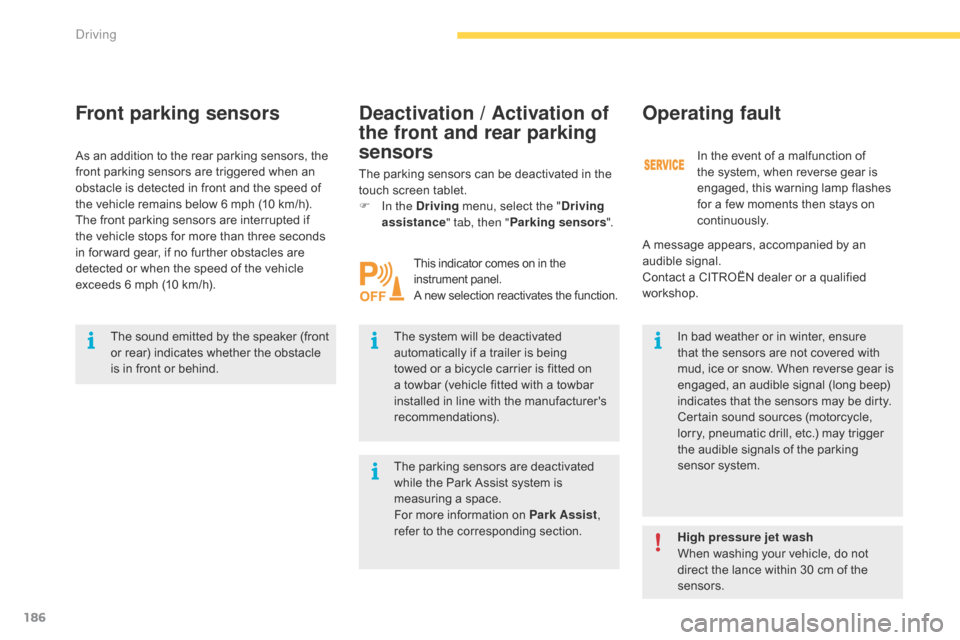
186
Front parking sensors
The sound emitted by the speaker (front or rear) indicates whether the obstacle
i
s in front or behind. The
system will be deactivated a
utomatically if a trailer is being
t
owed or a bicycle carrier is fitted on
a
towbar (vehicle fitted with a towbar
i
nstalled in line with the manufacturer's
r
ecommendations).In
bad weather or in winter, ensure t
hat the sensors are not covered with
m
ud, ice or snow. When reverse gear is
e
ngaged, an audible signal (long beep)
i
ndicates that the sensors may be dirty.
Certain
sound sources (motorcycle,
l
orry, pneumatic drill, etc.) may trigger
t
he audible signals of the parking
s
ensor system.
As
an
addition to the rear parking sensors, the
f
ront
parking sensors are triggered when an
o
bstacle is detected in front and the speed of
t
he
vehicle remains below 6 mph (10 km/h).
The
front parking sensors are interrupted if
t
he
vehicle stops for more than three seconds
i
n
for ward gear, if no further obstacles are
d
etected or when the speed of the vehicle
e
xceeds 6 mph (10 km/h). The parking sensors can be deactivated in the
t
ouch screen tablet.
F
I
n the Driving
menu, select the "
Driving
assistance " tab, then "Parking sensors ".
Operating fault
In the event of a malfunction of t
he system, when reverse gear is
e
ngaged, this warning lamp flashes
f
or a few moments then stays on
c
ontinuously.
This indicator comes on in the in strument pan el.
A
new selection reactivates the function.
High pressure jet wash
When washing your vehicle, do not
d
irect the lance within 30 cm of the
sen
sors.
The
parking
sensors
are
deactivated
w
hile
the
Park
Assist
system
is
m
easuring
a
space.
For
more
information
on
Park Assist
,
refer
to
the
corresponding
section.
Deactivation / Activation of
the front and rear parking
sensors
A message appears, accompanied by an a
udible s ignal.
Contact
a CITROËN dealer or a qualified
w
orkshop.
Driving
Page 189 of 523
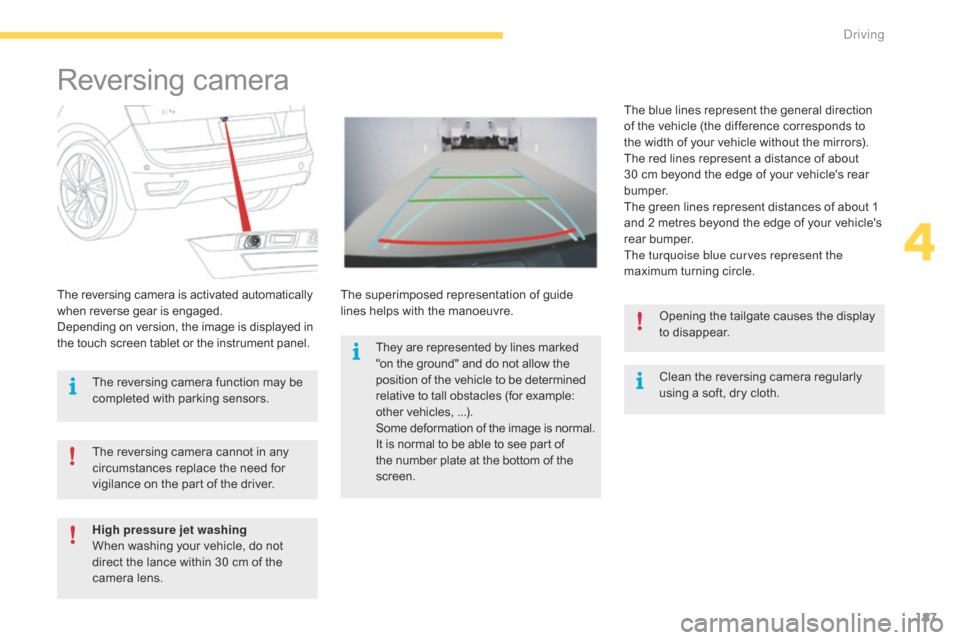
187
Reversing camera
Clean the reversing camera regularly u
sing a soft, dry cloth.
The
reversing
camera
is
activated
automatically
w
hen
r
everse
g
ear
i
s
enga
ged.
Depending
on
version,
the
image
is
displayed
in
t
he
touch
screen
tablet
or
the
instrument
panel. The
superimposed
representation
of
guide
l
ines
helps
with
the
manoeuvre. The
blue lines represent the general direction
o
f
the
vehicle (the difference corresponds to
t
he
width of your vehicle without the mirrors).
The
red lines represent a distance of about
3
0
cm
beyond the edge of your vehicle's rear
b
u m p e r.
The
green lines represent distances of about 1
a
nd
2
metres beyond the edge of your vehicle's
r
ear
bumper.
The turquoise blue curves represent the
maximum turning circle.
The
reversing
camera
cannot
in
any
c
ircumstances
replace
the
need
for
v
igilance
on
the
part
of
the
driver. Opening
the tailgate causes the display
t
o disappear.
The
reversing
camera
function
may
be
c
ompleted
with
parking
sensors.
High pressure jet washing
When
washing
your
vehicle,
do
not
d
irect
the
lance
within
30
cm
of
the
c
amera
lens. They
are
represented
by
lines
marked
"
on
the
ground"
and
do
not
allow
the p
osition
of
the
vehicle
to
be
determined r
elative
to
tall
obstacles
(for
example:
o
ther
vehicles, ...).
Some
d
eformation
o
f
t
he
i
mage
i
s
n
ormal.
It
is
normal
to
be
able
to
see
part
of
t
he
number
plate
at
the
bottom
of
the
sc
reen.
4
Driving
Page 190 of 523
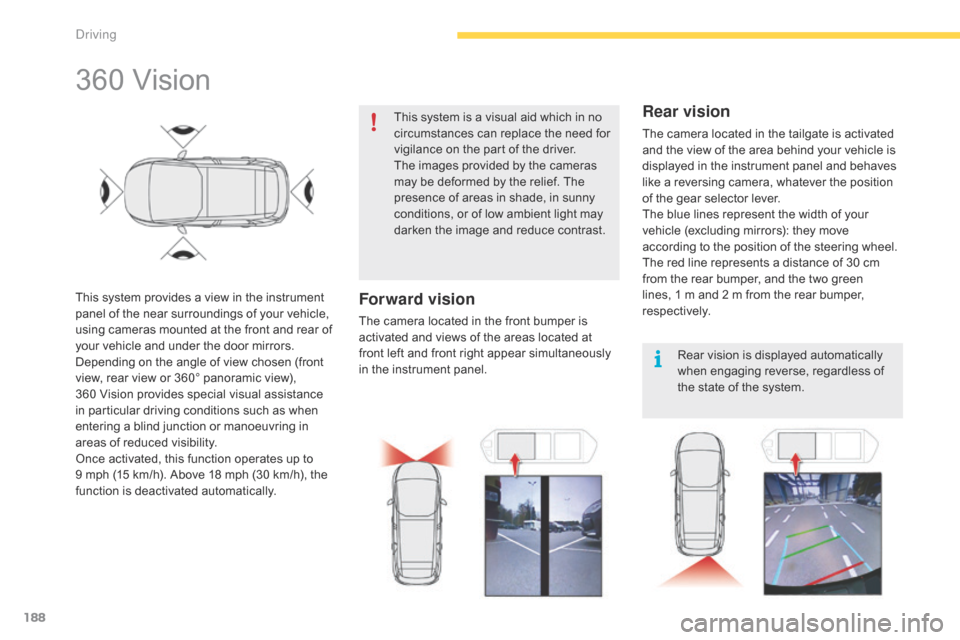
188
360 Vision
This system provides a view in the instrument panel of the near surroundings of your vehicle,
u
sing cameras mounted at the front and rear of
y
our vehicle and under the door mirrors.
Depending
on the angle of view chosen (front
v
iew, rear view or 360° panoramic view),
3
60 Vision provides special visual assistance
i
n particular driving conditions such as when
e
ntering a blind junction or manoeuvring in
a
reas of reduced visibility.
Once
activated, this function operates up to
9 m
ph (15 km/h). Above 18 mph (30 km/h), the
f
unction is deactivated automatically. This
system is a visual aid which in no
c
ircumstances can replace the need for
v
igilance on the part of the driver.
The images provided by the cameras
m
ay be deformed by the relief. The
p
resence of areas in shade, in sunny
c
onditions, or of low ambient light may
d
arken the image and reduce contrast.Forward vision
The camera located in the front bumper is a
ctivated and views of the areas located at
f
ront left and front right appear simultaneously
i
n the instrument panel.
Rear vision
The camera located in the tailgate is activated and the view of the area behind your vehicle is
d
isplayed in the instrument panel and behaves
l
ike a reversing camera, whatever the position
o
f the gear selector lever.
The
blue lines represent the width of your
v
ehicle (excluding mirrors): they move
a
ccording to the position of the steering wheel.
The
red line represents a distance of 30 cm
f
rom the rear bumper, and the two green
l
ines, 1 m and 2 m from the rear bumper,
r
espectively. Rear
vision is displayed automatically
w
hen engaging reverse, regardless of
t
he state of the system.
Driving
Page 198 of 523

196
F Select reverse, release the steering wheel a
nd start moving without exceeding 4 mph
(
7 km/h).
F
T
he assisted parking manoeuvre is in
p
rogress.
W
ithout exceeding 4 mph (7 km/h), follow
t
he instructions displayed in the instrument
p
anel, aided by the warnings from the
"
Parking sensors" system, until the
i
ndication of the end of the manoeuvre.At
the end of the manoeuvre, the operating i
ndicator lamp goes off in the instrument panel,
a
ccompanied by a message and an audible
s
ignal.
The
assistance is deactivated: you can take
ov
er control.During
parking and exit from p
arking manoeuvres, the reversing
c
amera function may come into
o
peration. It facilitates monitoring of
t
he surroundings of the vehicle, by
d
isplaying additional information in the
in
strument
pan
el.
For
more information on the Reversing
camera ,
refer to the corresponding
s
ection.
During
a bay parking manoeuvre, the
P
ark Assist system is automatically
d
eactivated once the rear of the vehicle
i
s within 50 cm of an obstacle.
Driving